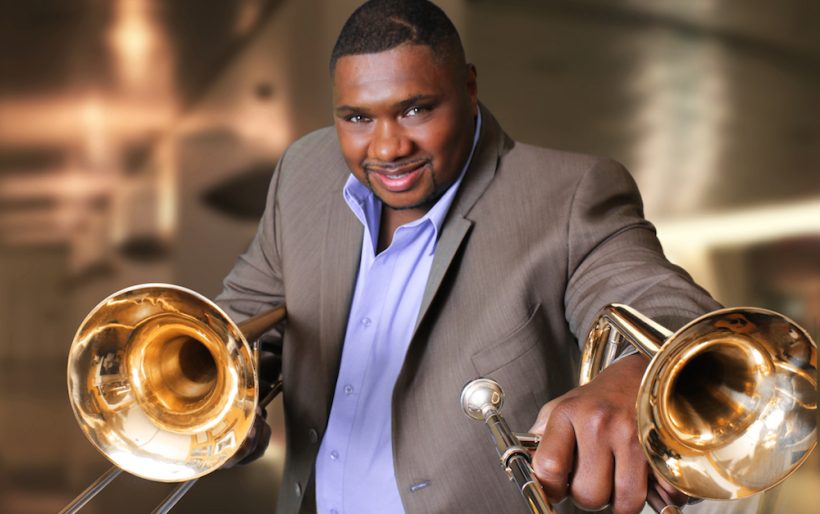Keeping the swing alive: Wycliffe Gordon will celebrate big band jazz in Mount Airy

Wycliffe Gordon | photo courtesy of the artist
Duke Ellington wrote “It Don’t Mean a Thing (If It Ain’t Got That Swing)” in 1931, heralding the dawn of the swing era a few years later. The days of the big band as popular music had long passed by the time Wycliffe Gordon was born in 1967, but the versatile trombonist has spent much of his career revisiting the music of the swing era, both as a former member of Wynton Marsalis’ Jazz at Lincoln Center Orchestra and fronting his own bands, which have recorded tribute albums to Ellington and Gordon’s idol, Louis Armstrong.
On Thursday, Gordon will pay yet another homage to the swing era with two shows at Mt. Airy’s Alma Mater, the second installment in the Modern Renaissance Jazz summer concert series that kicked off last month with James Carter playing boisterous tribute to Philly’s own jazz heritage, and continues in August with Living Colour drummer Will Calhoun.
For the occasion, Gordon will lead a quartet assembled by pianist Farid Barron, his former bandmate from the Jazz at Lincoln Center Orchestra and Marsalis’ Septet, featuring local musicians Jonathan Michel on bass and Anwar Marshall on drums. In a perfect world, Gordon said, the stage at Alma Mater would be much more crowded with musicians. “If it were up to me I’d have an orchestra, a choir and a big band so I could do everything that I love to play: jazz, gospel, even funk. I’m noted for being a jazz musician because that’s what I’ve made my career out of, but I just love music.”
If that desire seems to sprawl well beyond the confines of the evening’s professed dedication to the swing era, that’s fine with Gordon, who adheres to a definition of that period that looks far beyond the decade and a half leading up to World War II. “It’s hard to call one era the swing era,” he said, “because jazz was swinging for a long time before that era and there are plenty of musicians that crossed all of the different genres of jazz. Louis Armstrong was considered early or trad jazz, but his musical career spanned a lot of his lifetime, so he was a part of the swing era as well. We’re still part of the swing era, because people are still listening to it and playing it even though we have all kinds of different terms for it now.”
So expect the expected: classic tunes by Duke Ellington, Count Basie, Bennie Moten and Fats Waller. But also be prepared for the material to veer into more offbeat or contemporary places as well; calling from Berklee College of Music in Boston, where he was teaching as part of trumpeter Sean Jones’ summer brass camp, Gordon hadn’t yet settled on a setlist for this week’s performances but mused on a few possibilities that would cross from one era to another and hopefully unite diverse audience tastes.
“In the spirit of improvisation, I’m going to play with the word ‘swing.’ We all love music that’s popular from our time as teenagers, and most of our audience tends to be older people – for them, that was the big band/swing era. But in order to bring new people into the fold, I like to bring things current as well. I grew up listening to the Count Basie Orchestra and Duke Ellington, but I also heard Parliament/Funkadelic. George Benson played with a big band but also played “Give Me the Night.” So I’m trying to figure out ways to incorporate new songs into swing or swing into popular music from today.”
Armstrong, the subject of Gordon’s 2011 CD Hello Pops, continues to loom large in the trombonist’s own personal pantheon, along with other music from New Orleans as well as the swing era. While his tastes are expansive, he continues to return to those jazz landmarks, he explained, for very simple reasons.
“It’s the songs. Jazz was something that you could listen to, dance to, snap your fingers to. It still is, I guess [sings a rapid-fire bebop riff], but I’m talking about the lowest common denominator. Everyone could sing and dance to those songs.”
Wycliffe Gordon performs at Alma Mater in Mount Airy on Thursday, July 14th; tickets and information can be found here.